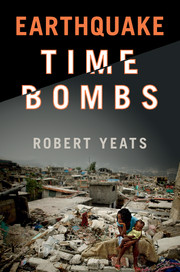Book contents
- Frontmatter
- Contents
- Acknowledgments
- Why this book?
- PART I EARTHQUAKES, DEEP TIME, AND THE POPULATION EXPLOSION
- PART II EARTHQUAKE TIME BOMBS
- TIME BOMBS WHERE THE PROBLEM IS UNDERSTOOD, BUT THE RESPONSE IS STILL INADEQUATE
- OTHER TIME BOMBS, INCLUDING CITIES THAT ARE NOT WELL PREPARED
- 13 Age of Enlightenment and the 1755 Lisbon earthquake
- 14 Jerusalem: earthquakes in the Holy Land
- 15 Istanbul: responding to an official earthquake warning
- 16 Tehran: the next earthquake in the Islamic Republic of Iran?
- 17 Kabul: decades of war and Babur's warning
- 18 Earthquakes in the Himalaya
- 19 Myanmar and the Sagaing fault
- 20 Metro Manila, the Philippines
- 21 Lima, Peru: Inca earthquake-resistant construction and a bogus American earthquake prediction
- 22 Andean earthquakes in Quito and Guayaquil, Ecuador
- 23 Caracas: lots of oil, but little interest in earthquakes
- 24 Haiti, which lost its gamble, and Jamaica and Cuba (not yet)
- 25 Mexico City: bowl of jello inherited from the Aztecs
- 26 Central America and the earthquake that brought down a dictator
- 27 East African Rift Valley: a tale of two cities
- PART III SUMMARY AND RECOMMENDATIONS
- References
- Index
24 - Haiti, which lost its gamble, and Jamaica and Cuba (not yet)
from OTHER TIME BOMBS, INCLUDING CITIES THAT ARE NOT WELL PREPARED
Published online by Cambridge University Press: 05 November 2015
- Frontmatter
- Contents
- Acknowledgments
- Why this book?
- PART I EARTHQUAKES, DEEP TIME, AND THE POPULATION EXPLOSION
- PART II EARTHQUAKE TIME BOMBS
- TIME BOMBS WHERE THE PROBLEM IS UNDERSTOOD, BUT THE RESPONSE IS STILL INADEQUATE
- OTHER TIME BOMBS, INCLUDING CITIES THAT ARE NOT WELL PREPARED
- 13 Age of Enlightenment and the 1755 Lisbon earthquake
- 14 Jerusalem: earthquakes in the Holy Land
- 15 Istanbul: responding to an official earthquake warning
- 16 Tehran: the next earthquake in the Islamic Republic of Iran?
- 17 Kabul: decades of war and Babur's warning
- 18 Earthquakes in the Himalaya
- 19 Myanmar and the Sagaing fault
- 20 Metro Manila, the Philippines
- 21 Lima, Peru: Inca earthquake-resistant construction and a bogus American earthquake prediction
- 22 Andean earthquakes in Quito and Guayaquil, Ecuador
- 23 Caracas: lots of oil, but little interest in earthquakes
- 24 Haiti, which lost its gamble, and Jamaica and Cuba (not yet)
- 25 Mexico City: bowl of jello inherited from the Aztecs
- 26 Central America and the earthquake that brought down a dictator
- 27 East African Rift Valley: a tale of two cities
- PART III SUMMARY AND RECOMMENDATIONS
- References
- Index
Summary
INTRODUCTION
The Greater Antilles region of the Caribbean is composed of island countries of moderate size that are close to, or are on, tectonic plate boundaries (Figure 24.1). These countries contain large, rapidly growing cities that are considered to be earthquake time bombs. One of these time bombs went off in January 2010. Port-au-Prince, the capital city of Haiti, was destroyed in the Léogâne earthquake of magnitude 7. Although help from the international community was sent to Haiti after that earthquake, it has not been enough. Much of the city is still in ruins, with many people still living in tents and damaged houses five years after the earthquake. But Port-au-Prince is not alone in having an earthquake problem. Other nations, including Jamaica and the Dominican Republic, have heavily populated cities close to active faults but do not have the resources to repair these cities if they are destroyed in an earthquake. Cuba has a better-developed social services system, but the southeastern end of the island also includes earthquake time bombs. But the fault that is the source of future Cuban earthquakes is offshore, and the earthquake problem is not a priority for the Cuban government.
HAITI
Haiti was not always the basket case of the Caribbean. In the late eighteenth century, the French colony of Haiti, also called Saint-Domingue, provided 40% of the sugar and 60% of the coffee imported by Europe. It was so rich that it had become known as the Pearl of the Antilles, with the industry supported by thousands of African slaves ruled by a small aristocracy of white French plantation owners. Haiti, after its revolution, even provided assistance to Simón Bolívar in his drive in the early nineteenth century for independence of Venezuela and other South American countries from Spain.
Following a successful slave revolution at about the same time as American independence and the French revolution, the country became mired in conflict and mismanagement, so that by 2010 there were very few social services, and little money to deal with disasters such as hurricanes and epidemics. But Port-au-Prince had another, hidden problem. The active Enriquillo fault extends east–west, just south of the city, and is a known generator of earthquakes. The Enriquillo fault was known to be a time bomb that could rupture in a devastating earthquake at any time.
- Type
- Chapter
- Information
- Earthquake Time Bombs , pp. 278 - 288Publisher: Cambridge University PressPrint publication year: 2015



